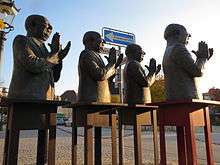หน้าม้า
Thai

fringe worn by singer Im Yoona.

a sculpture by Guido Messer, representing a claque.
Pronunciation
| Orthographic | หน้าม้า h n ˆ ā m ˆ ā | |
| Phonemic | น่า-ม้า n ˋ ā – m ˆ ā | |
| Romanization | Paiboon | nâa-máa |
| Royal Institute | na-ma | |
| (standard) IPA(key) | /naː˥˩.maː˦˥/ | |
Etymology 1
From หน้า (nâa, “face; front; etc.”) + ม้า (máa, “horse”), literally "horse front", referring to the hair between the horse's ears that falls onto the forehead.
Synonyms
- ม้า (máa)
- ผมม้า
Related terms
- หางม้า (hǎang-máa, “ponytail”, literally “horse tail”)
Etymology 2
From หน้า (nâa, “face; front; etc.”) + ม้า (máa, “bench; stool; etc.”), literally "front bench", originating from the fraudulent practice of hiring a person or group of persons to sit in the front row and applaud or boo a performance or performer.
Noun
หน้าม้า • (nâa-máa)
Synonyms
- อัศวมุขี
This article is issued from
Wiktionary.
The text is licensed under Creative
Commons - Attribution - Sharealike.
Additional terms may apply for the media files.